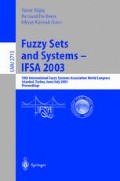Abstract
In this paper, the study of the evolution of approximation space theory and its applications is considered in the context of rough sets introduced by Zdzisław Pawlak and information granulation as well as computing with words formulated by Lotfi Zadeh. Central to this evolution is the rough-mereological approach to approximation of information granules. This approach is built on the inclusion relation to be a part to a degree, which generalises the rough set and fuzzy set approaches. An illustration of information granulation of relational structures is given. The contribution of this paper is a comprehensive view of the notion of information granule approximation, approximation spaces in the context of rough sets and the role of such spaces in the calculi of information granules.
Access this chapter
Tax calculation will be finalised at checkout
Purchases are for personal use only
Preview
Unable to display preview. Download preview PDF.
References
Leśniewski, S.: Grundzüge eines neuen Systems der Grundlagen der Mathematik. Fundamenta Mathematicae 14 (1929) 1–81
Lin, T.Y., Yao, Y.Y., Zadeh, L.A. (eds.): Data Mining, Rough Sets and Granular Computing. Physica-Verlag, Heidelberg (2002)
Mitchell, T.M.: Machine Learning. Mc Graw-Hill, Portland (1997)
Pal, S.K., Polkowski, L., Skowron, A. (eds.): Rough-Neuro Computing: Techniques for Computing with Words. Springer-Verlag, Berlin (2003) (to appear)
Pal, S.K., Skowron, A. (eds.): Rough Fuzzy Hybridization: A New Trend in Decision-Making. Springer-Verlag, Singapore (1999)
Pawlak, Z.: Rough sets. International Journal of Computer and Information Sciences 11 (1982) 341–356
Pawlak, Z.: Rough Sets. Theoretical Aspects of Reasoning about Data. Kluwer Academic Publishers, Dordrecht (1991)
Peters, J.F., Ahn, T.C., Degtyaryov, V., Borkowski, M., Ramanna, S.: Autonomous Robotic Systems: Soft Computing and Hard Computing Methodologies and Applications. In: Zhou, C., Maravall, D., Ruan, D. (eds.), Fusion of Soft Computing and Hard Computing for Autonomous Robotic Systems. Physica-Verlag, Heidelberg (2003) 141–164
Peters, J.F., Ramanna, S., Borkowski, M., Skowron, A., Suraj, Z.: Sensor, filter and fusion models with rough Petri nets, Fundamenta Informaticae 47(3&2) (2001) 307–323
Peters, J.F., Skowron, A., Stepaniuk, J., Ramanna, S.: Towards an ontology of approximate reason. Fundamenta Informaticae 51(1–2) (2002) 157–173
Polkowski, L., Skowron, A.: Rough mereology: a new paradigm for approximate reasoning. International J. Approximate Reasoning 15(4) (1996) 333–365
Polkowski, L., Skowron, A. (eds.): Rough Sets in Knowledge Discovery 1–2. Physica-Verlag, Heidelberg (1998)
Polkowski, L., Skowron, A.: Towards adaptive calculus of granules. In: Kacprzyk, J. (eds.): Computing with Words in Information/Intelligent Systems 1–2, Physica-Verlag, Heidelberg [27], (1999) 201–227
Polkowski, L., Skowron, A.: Rough mereological calculi of granules: A rough set approach to computation. Computational Intelligence 17(3) (2001) 472–492
Polkowski, L., Skowron, A.: Rough-neuro computing. Lecture Notes in Artificial Intelligence 2005, Springer-Verlag, Berlin (2002) 57–64
Skowron, A.: Toward intelligent systems: Calculi of information granules. Bulletin of the International Rough Set Society 5(1–2) (2001) 9–30
Skowron, A., Approximate reasoning by agents in distributed environments. In: Liu, J., Ohsuga, S., Bradshaw, J. (eds.): Intelligent agent technology: Research and development, 2nd Asia-Pacific Conf. on IAT, Maebashi City (2001) [28] (2001) 28–39
Skowron, A., Stepaniuk, J.: Tolerance approximation spaces. Fundamenta Informaticae 27 (1996) 245–253
Skowron, A., Stepaniuk, J.: Information granules: Towards foundations of granular computing. International Journal of Intelligent Systems 16(1) (2001) 57–86
Skowron, A., Stepaniuk, J.: Information granules and rough-neuro computing. To appear in [4]
Słlowiński, R., Greco, S., Matarazzo, B.: Rough set analysis of preference-ordered data. LNAI 2475, Springer-Verlag, Heidelberg (2002) 44–59
WITAS. available at http://www.ida.liu.se/ext/witas/eng.html. Project web page
Wróblewski, J.: Adaptive Methods of Object Classification. Ph.D. Thesis, Warsaw University (2002) (in Polish)
Zadeh, L.A.: Fuzzy logic = computing with words. IEEE Trans. on Fuzzy Systems 4 (1996) 103–111
Zadeh, L.A.: Toward a theory of fuzzy information granulation and its certainty in human reasoning and fuzzy logic. Fuzzy Sets and Systems 90 (1997) 111–127
Zadeh, L.A.: A new direction in AI: Toward a computational theory of perceptions. AI Magazine 22(1) (2001) 73–84
Zadeh, L.A., Kacprzyk, J. (eds.): Computing with Words in Information/Intelligent Systems 1–2, Physica-Verlag, Heidelberg (1999)
Zhong, N., Liu, J., Ohsuga, S., Bradshaw, J. (eds.): Intelligent agent technology: Research and development, 2nd Asia-Pacific Conf. on IAT, Maebashi City (2001)
Author information
Authors and Affiliations
Editor information
Editors and Affiliations
Rights and permissions
Copyright information
© 2003 Springer-Verlag Berlin Heidelberg
About this paper
Cite this paper
Peters, J.F., Skowron, A., Synak, P., Ramanna, S. (2003). Rough Sets and Information Granulation. In: Bilgiç, T., De Baets, B., Kaynak, O. (eds) Fuzzy Sets and Systems — IFSA 2003. IFSA 2003. Lecture Notes in Computer Science, vol 2715. Springer, Berlin, Heidelberg. https://doi.org/10.1007/3-540-44967-1_44
Download citation
DOI: https://doi.org/10.1007/3-540-44967-1_44
Published:
Publisher Name: Springer, Berlin, Heidelberg
Print ISBN: 978-3-540-40383-8
Online ISBN: 978-3-540-44967-6
eBook Packages: Springer Book Archive

